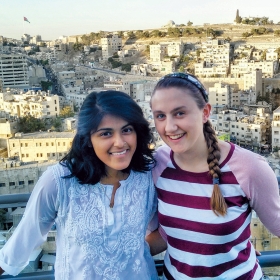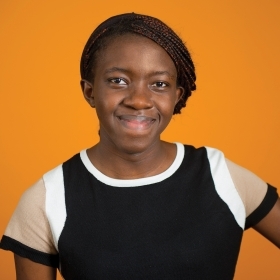Two Wellesley students spent a semester attending the Middlebury Language School in Jordan, where they improved their Arabic and enjoyed some culinary side benefits.

What drew you to the Jordan program?
Chennat: I had always been interested in Middlebury Language Schools for the language pledge. This pledge requires that we speak only the language of focus for the duration of the program. Fluency in Arabic is a lifetime commitment, but I know that Middlebury in Jordan is a step in the right direction.
Wills: My main goal for the semester is to improve my Arabic. I was drawn to the Middlebury program because of its academic rigor and the language pledge. I may have also had falafel in mind when I was filling out the application.
What is your academic program like?
Chennat: The Middlebury Language School in Jordan uses the University of Jordan’s facilities. All of our classes are taught in Arabic. We take four classes: Modern Standard Arabic (MSA), Amiyya (Jordanian Dialect), and the other two being electives, I chose Arabic to English Translation and Political Issues in the Middle East. My classes and professors are wonderful!
Where are you living?
Wills: I live with a host family in Amman, which is an adventure in and of itself. While it is challenging to integrate myself into their daily routine, the constant linguistic and cultural immersion is incredibly rewarding. The homemade food is also a delicious bonus.
What activities are you involved in?
Chennat: Two other students and I are volunteering at a school for blind and mentally impaired children. I really struggled with my language skills at first, as I had no visual aids (facial expressions, gesturing, etc.), and until I started volunteering there, I hadn’t realized just how much I depended on such tools to communicate—not only in my shaky Arabic but in English, as well. Language aside, I have gotten to know the children, and they are always so excited to play with us and ready to participate in our lesson plans.
We usually sing a song for them, and then teach them a short song that we all sing together. Music is an extremely important part of my life at Wellesley (I am a member of the Blue Notes), and I definitely felt the loss for it throughout this semester abroad. So, these 30-minute lessons have been a wonderful means of filling that gap while simultaneously engaging the kids in a new and exciting way.
What is your favorite part of the day?
Wills: Hanging out with the students from the University of Jordan who serve as our mentors. They help us navigate both city streets and cultural differences. We hang out after classes and play cards or work on homework together or just hang out and talk. I can’t say I have a least favorite part of my day other than waking up at 7 a.m. for class.
What surprised you most about life in Amman?
Chennat: Amman is an interesting mix of Arab, Muslim, and Western influences. I spent this past summer in Tangier, Morocco. It is interesting to see which components are present in both cultures—for example, the café culture—and find others that are integral in one culture and practically nonexistent in the other, for example, the hammans/public baths in Morocco. Some days, I walk around Amman and feel as if I’m in a city in the United States, and other days I know that I could be in no other place than the Middle East. This city keeps me guessing.

